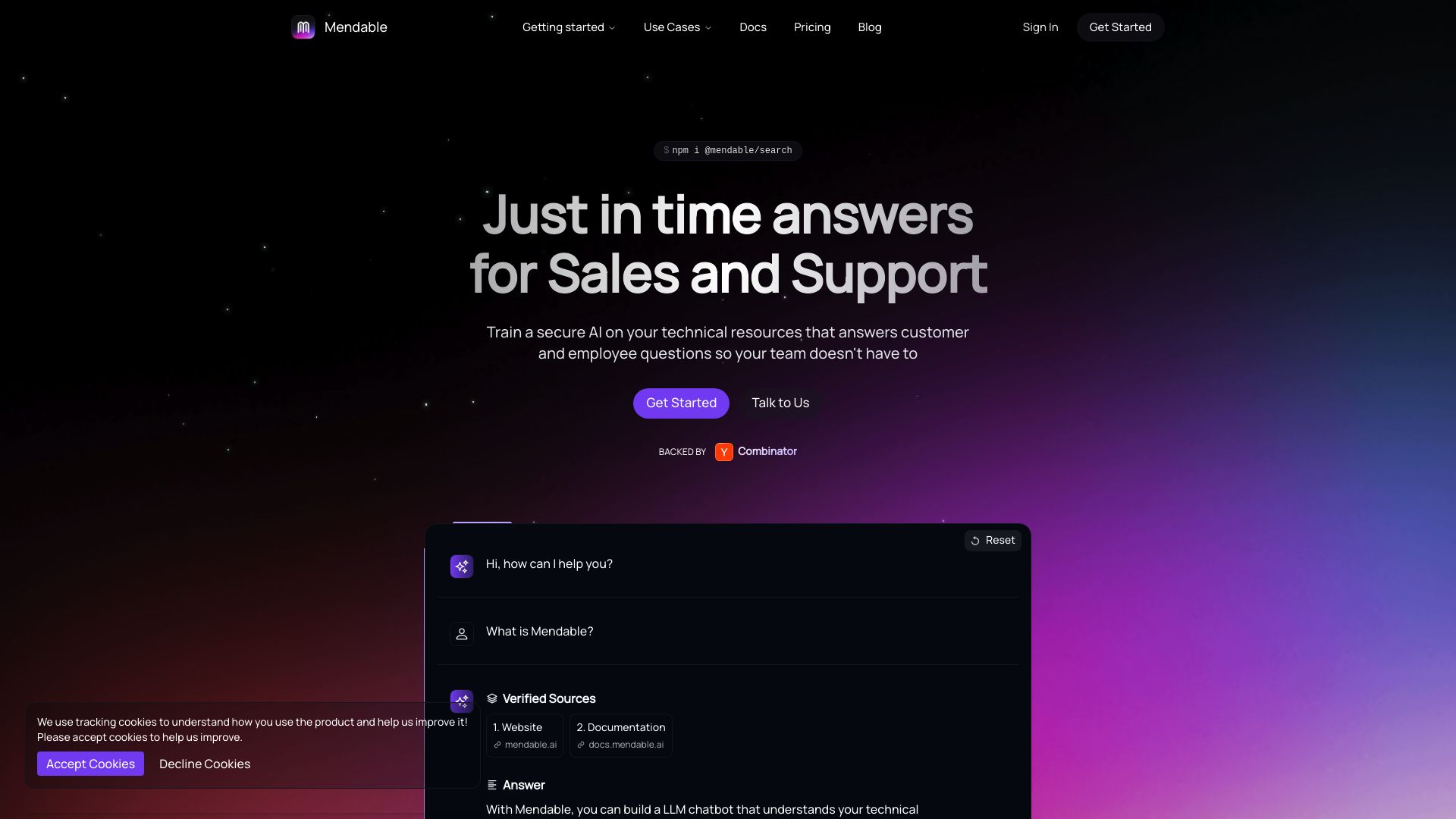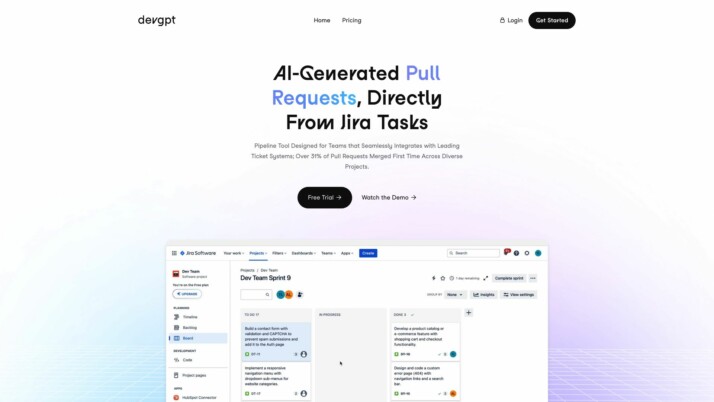Mendable vs. DevGPT: AI-Powered Search Meets Code Generation
AI-driven solutions revolutionize software development and information retrieval, empowering businesses to harness cutting-edge technology. This comparison explores Mendable’s AI-powered search capabilities, DevGPT’s code generation prowess, and SmythOS’s comprehensive AI development platform. We delve into each solution’s core features, integration options, and potential impact on productivity. Whether you’re a developer seeking to streamline coding tasks, a business leader aiming to enhance information accessibility, or an enterprise looking to deploy versatile AI agents, this analysis equips you with the insights to choose the right tool for your needs. Discover how these platforms stack up in terms of user-friendliness, security, and scalability, and learn which solution offers the most robust set of features for AI-driven innovation.
Mendable Overview
Mendable delivers AI-powered search capabilities for applications and websites. The platform integrates chat components that provide accurate, contextual answers based on existing documentation.


Mendable’s core offering revolves around its chat-powered search components. These include the Search Bar, Floating Button, InPlace Component, and Chat Bubble. Each component serves different use cases, allowing developers to integrate AI-driven search functionality into their applications seamlessly.
Mendable’s core offering revolves around its chat-powered search components… allowing developers to integrate AI-driven search functionality into their applications seamlessly.
The platform supports data ingestion from various sources, including websites, GitHub repositories, Notion pages, and Zendesk. This versatility enables organizations to leverage their existing documentation effectively. Mendable’s auto-sync feature ensures that information remains up-to-date, providing users with the most current answers.
Developers benefit from Mendable’s robust API and SDKs, including a Python SDK for extensive customization. The platform offers prompt customization capabilities, allowing users to frame AI responses using templates and dynamic variables. This feature enhances the relevance and clarity of responses, tailoring them to specific use cases.
Mendable also provides Product Copilots, which are tailored components that deliver context-aware answers based on application-specific data. This feature enhances user support within applications, providing a more personalized experience. Integration with popular platforms like Slack, Discord, and WordPress further extends Mendable’s reach, allowing for versatile use across different environments.
While Mendable excels in AI-powered search and chat components, it lacks some features found in more comprehensive AI agent builders. The platform does not offer a visual builder or no-code editor, which may limit accessibility for non-technical users. Additionally, Mendable does not support autonomous agents or multi-agent collaboration, focusing instead on enhancing search and information retrieval capabilities.
DevGPT Overview
DevGPT transforms natural language prompts into executable code, streamlining software development workflows. This open-source AI assistant automates repetitive coding tasks, allowing developers to focus on complex challenges.


DevGPT transforms natural language prompts into executable code, streamlining software development workflows. This open-source AI assistant automates repetitiv
DevGPT integrates with GitHub and Jira, automating pull request generation from tasks and tickets. Powered by advanced models like GPT-4 and Codex, it generates context-aware code snippets tailored to individual coding styles.
The platform’s personalized training feature adapts to each developer’s unique codebase, ensuring generated code aligns with existing projects. Users can fine-tune outputs through comments, enhancing code quality and relevance. Early adopters report significant time savings, with some developers reclaiming over 10 hours per week.
Early adopters report significant time savings, with some developers reclaiming over 10 hours per week.
While DevGPT excels at automating individual tasks, it lacks some enterprise-level features. The platform currently focuses on serving individuals and small teams, potentially limiting its scalability for larger organizations. Additionally, DevGPT does not offer a visual builder or no-code editor, which may present a steeper learning curve for non-technical users.
DevGPT aims to become an indispensable AI coding companion, expanding its reach from individual developers to companies of all sizes. By fostering an engaged community of users and contributors, the platform seeks to drive continuous improvement and innovation in AI-assisted software development.
Feature Comparison
Mendable and DevGPT offer distinct approaches to AI-assisted development, with some key differences in their core capabilities. Mendable focuses on enhancing search and information retrieval through AI-powered components, while DevGPT aims to automate code generation from natural language prompts.
In terms of core components, Mendable lacks a visual builder or no-code editor, potentially limiting accessibility for non-technical users. DevGPT also does not offer these features, instead relying on natural language processing to generate code. This gap in visual development tools contrasts with SmythOS, which provides a robust drag-and-drop interface for creating AI workflows without extensive coding knowledge.
Security features present another area of divergence. While both Mendable and DevGPT offer basic integration capabilities, neither explicitly mentions advanced security measures like data encryption or OAuth authentication. SmythOS, on the other hand, emphasizes security with features such as constrained alignment and comprehensive data protection protocols, making it a more suitable choice for enterprises with stringent security requirements.
DevGPT’s focus on code generation from natural language prompts offers a unique approach to development automation. However, it may not provide the same level of versatility as SmythOS in terms of deploying AI agents across various platforms and environments. SmythOS allows for deployment as APIs, webhooks, scheduled agents, and more, offering greater flexibility in how AI solutions can be integrated into existing systems.
Feature Comparison Table
| Mendable | DevGPT | SmythOS | |
|---|---|---|---|
| CORE FEATURES | |||
| Hosted Agents (Dev, Production) | ❌ | ❌ | ✅ |
| Environments (Dev, Production) | ❌ | ❌ | ✅ |
| Visual Builder | ❌ | ❌ | ✅ |
| No-Code Options | ❌ | ❌ | ✅ |
| Autonomous Agents | ❌ | ❌ | ✅ |
| Explainability & Transparency | ✅ | ❌ | ✅ |
| Debug Tools | ❌ | ✅ | ✅ |
| Multimodal | ❌ | ❌ | ✅ |
| Multi-Agent Collaboration | ❌ | ❌ | ✅ |
| Audit Logs for Analytics | ✅ | ❌ | ✅ |
| Work as Team | ❌ | ✅ | ✅ |
| Bulk Work | ✅ | ❌ | ✅ |
| Agent Work Scheduler | ❌ | ❌ | ✅ |
| Logs & Monitoring | ✅ | ❌ | ✅ |
| SECURITY | |||
| Constrained Alignment | ❌ | ❌ | ✅ |
| Data Encryption | ✅ | ❌ | ✅ |
| OAuth | ✅ | ❌ | ✅ |
| IP Control | ❌ | ❌ | ✅ |
| COMPONENTS | |||
| Foundation AIs | ❌ | ❌ | ✅ |
| Huggingface AIs | ❌ | ❌ | ✅ |
| Zapier APIs | ❌ | ❌ | ✅ |
| All other APIs, RPA | ✅ | ❌ | ✅ |
| Classifiers | ❌ | ❌ | ✅ |
| Logic | ❌ | ❌ | ✅ |
| Data Lakes | ❌ | ❌ | ✅ |
| DEPLOYMENT OPTIONS (EMBODIMENTS) | |||
| Deploy as API | ✅ | ❌ | ✅ |
| Deploy as Webhook | ❌ | ❌ | ✅ |
| Staging Domains | ❌ | ❌ | ✅ |
| Production Domains | ❌ | ❌ | ✅ |
| API Authentication (OAuth + Key) | ✅ | ❌ | ✅ |
| Deploy as Site Chat | ✅ | ❌ | ✅ |
| Deploy as Scheduled Agent | ❌ | ❌ | ✅ |
| Deploy as GPT | ❌ | ❌ | ✅ |
| Scalability | ✅ | ❌ | ✅ |
| DATA LAKE SUPPORT | |||
| Hosted Vector Database | ❌ | ❌ | ✅ |
| Sitemap Crawler | ❌ | ❌ | ✅ |
| YouTube Transcript Crawler | ❌ | ❌ | ✅ |
| URL Crawler | ❌ | ❌ | ✅ |
| PDF Support | ✅ | ❌ | ✅ |
| Word File Support | ✅ | ❌ | ✅ |
Best Alternative to Mendable and DevGPT
SmythOS stands out as the superior alternative to Mendable and DevGPT for AI agent development and deployment. Our platform offers a comprehensive solution that addresses the limitations of both competitors while providing unparalleled versatility and ease of use.
We designed SmythOS with a powerful visual builder and no-code options, making AI development accessible to users of all skill levels. This contrasts sharply with Mendable and DevGPT, which lack these user-friendly features. Our drag-and-drop interface allows rapid creation of complex AI workflows without extensive coding knowledge, democratizing AI development across organizations.
SmythOS excels in deployment flexibility, offering options that Mendable and DevGPT simply can’t match. We enable users to deploy AI agents as APIs, webhooks, scheduled tasks, site chat interfaces, and even GPT models.
SmythOS excels in deployment flexibility, offering options that Mendable and DevGPT simply can’t match. We enable users to deploy AI agents as APIs, webhooks, scheduled tasks, site chat interfaces, and even GPT models. This versatility ensures that AI solutions integrate seamlessly into existing systems and workflows, addressing a wide range of business needs.
Security and scalability set SmythOS apart from the competition. We prioritize data protection with robust encryption, OAuth authentication, and IP control features. Our platform scales effortlessly to meet enterprise-level demands while maintaining peak performance. These critical aspects often lack in Mendable and DevGPT, making SmythOS the clear choice for businesses serious about AI implementation.
With SmythOS, users gain access to a rich ecosystem of integrations and components not found in Mendable or DevGPT. Our platform supports a variety of foundation AI models, Hugging Face integrations, and connections to popular services through Zapier. This extensive library of tools and integrations empowers users to create sophisticated, multi-agent systems capable of tackling complex tasks across various domains.
Conclusion
Mendable and DevGPT offer unique approaches to AI-assisted development, but SmythOS emerges as the superior choice for businesses seeking comprehensive AI solutions. While Mendable excels in AI-powered search and DevGPT focuses on code generation, SmythOS provides a versatile platform for creating and deploying AI agents across various environments.
SmythOS’s drag-and-drop interface and no-code editor make it accessible to both technical and non-technical users, addressing a key limitation of Mendable and DevGPT. The platform’s robust security features, including data encryption and OAuth authentication, surpass the basic integrations offered by its competitors, making it ideal for enterprises with stringent security requirements.
The ability to deploy AI agents as APIs, webhooks, scheduled tasks, and chatbots gives SmythOS unparalleled flexibility. This versatility, combined with support for multi-agent collaboration and autonomous operations, positions SmythOS as a frontrunner in the AI development space. For businesses looking to harness the full potential of AI across their operations, SmythOS offers a comprehensive solution that outperforms both Mendable and DevGPT.
Ready to revolutionize your AI workflow? Explore SmythOS’s diverse range of AI-powered agent templates and start building your own AI agents for free. With SmythOS, you’re not just adopting a tool – you’re embracing the future of AI-driven business innovation.
Last updated:
Disclaimer: The information presented in this article is for general informational purposes only and is provided as is. While we strive to keep the content up-to-date and accurate, we make no representations or warranties of any kind, express or implied, about the completeness, accuracy, reliability, suitability, or availability of the information contained in this article.
Any reliance you place on such information is strictly at your own risk. We reserve the right to make additions, deletions, or modifications to the contents of this article at any time without prior notice.
In no event will we be liable for any loss or damage including without limitation, indirect or consequential loss or damage, or any loss or damage whatsoever arising from loss of data, profits, or any other loss not specified herein arising out of, or in connection with, the use of this article.
Despite our best efforts, this article may contain oversights, errors, or omissions. If you notice any inaccuracies or have concerns about the content, please report them through our content feedback form. Your input helps us maintain the quality and reliability of our information.
